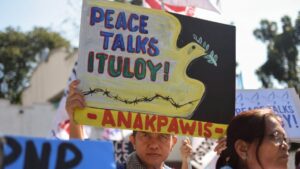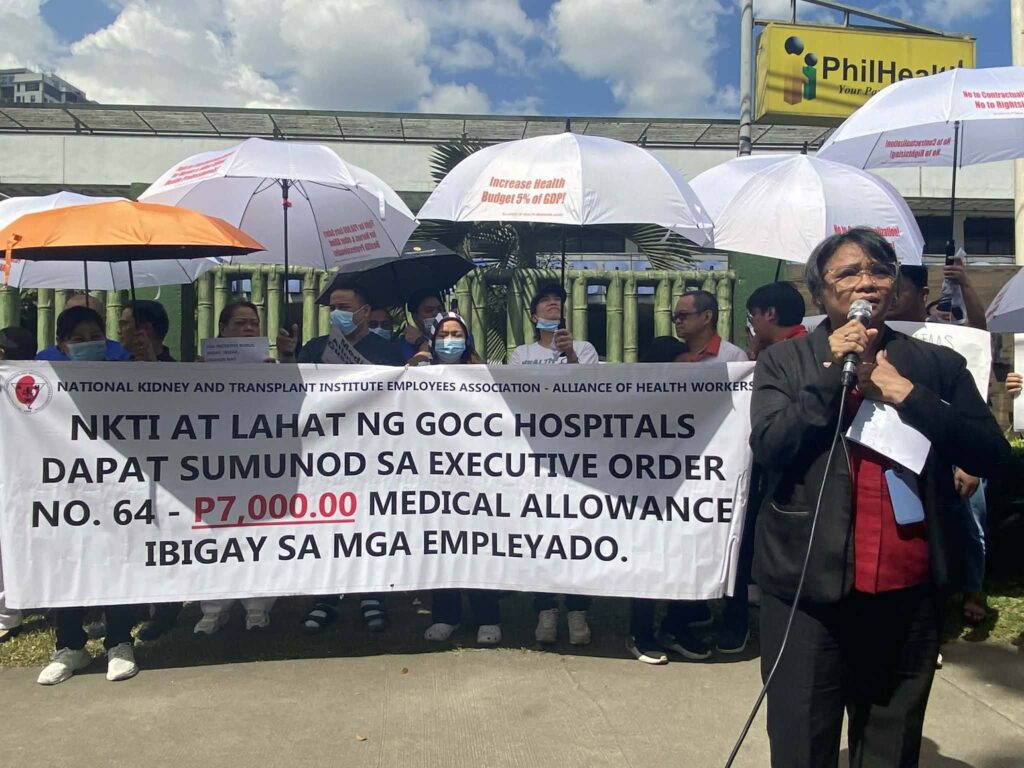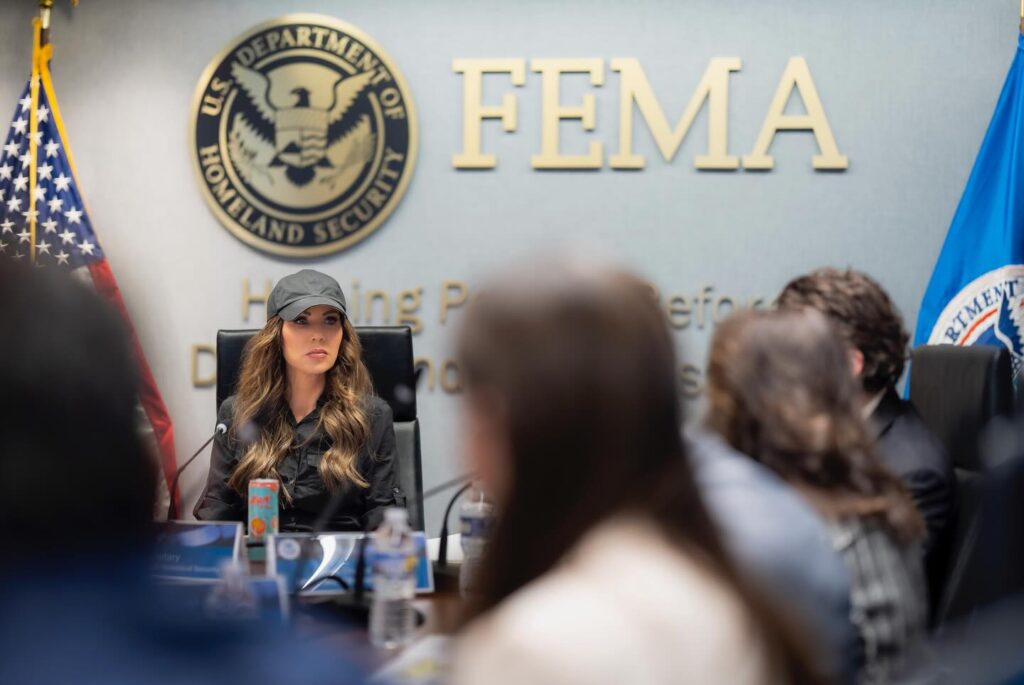Photo by Carlo Manalansan/Bulatlat
There has been no progress since the Ferdinand Marcos Jr. government and the National Democratic Front of the Philippines (NDFP) Negotiating Panel simultaneously announced backchannel discussions to revive formal peace negotiations, peace advocates complained.
Peace advocates issued statements on Sunday, November 23, expressing frustration at the lack of development in the process two years since the announcements.
The Council of Leaders for Peace Initiatives (CLPI) expressed “utter disappointment,” adding: “It is discouraging that there has been no significant advancement since.”
The group said there has been no news from both parties of a “new framework agreement” mentioned in past statements, without which formal peace negotiations cannot start.
Church-based peace group Pilgrims for Peace also commemorated yesterday’s second anniversary of the announcement, noting formal peace negotiations are still “in abeyance.”
“Now that two years have passed, we urge the two Parties to publicly announce their panels as well as the progress in their negotiations and to get to work,” Pilgrims said.
The 2023 GRP (Government of the Republic of the Philippines)-NDFP Joint Statement expressed awareness of difficult economic and environmental realities. These remain compelling grounds to revive the momentum for a productive peace process,” the group said of the November communiqué.
Differences in focus
In simultaneous press conferences, the GRP in Malacanang Palace and the NDFP panel in Utrecht in The Netherlands said a series of informal discussions were held in The Netherlands and Norway starting in 2022 between Marcos emissaries and NDFP peace negotiators.
It resulted in a joint communiqué that was also announced by The Royal Norwegian Government, long-time third party facilitator to the peace process between the GRP and the NDFP.
In their separate press conferences and subsequent statements however, there have been obvious differences in what the respective parties wanted to highlight in the possible resumption of talks.
In the Malacanang press conference, presidential peace adviser Carlito Galvez Jr. focused on the ending of the armed struggle, claiming, “The two sides have come to an understanding to end the decades-old armed conflict in the country.”
“Both sides have affirmed their sincere desire to achieve national reconciliation and unity under the Marcos administration, agreeing to resolve and further address socioeconomic and political issues towards achieving a peaceful end to the armed conflict and armed struggle of the CPP-NPA-NDFP,” he said.
NDFP Negotiating Panel chairperson Julie de Lima for her part underscored the achievement of more comprehensive agreements to address the roots of the armed conflict.
“It is our goal that the peace negotiations would result in comprehensive agreement on social, economic, political and constitutional reforms and provide the solution to problems which have long burdened the Filipino people,” de Lima said.
Civil war, propaganda war
The very next day, November 29, then Philippine Army chief Lt. Gen. Roy Galido took a jab at the Communist Party of the Philippines (CPP) and the New People’s Army (NPA), demanding an end to their armed struggle.
“While the NDFP pursues peaceful means to resolve and address social reforms, we expect the remaining members of the (CPP-NPA) to lay down arms and follow its lead,” Galido said.
CPP chief information officer Marco Valbuena quickly dismissed Galido’s call, saying the general was desperate because of the GRP’s failure to achieve its oft-repeated promise to eliminate the NPA.
Valbuena said the NPA would continue its armed struggle, claiming the revolutionary movement was strengthening rather than weakening.
President Marcos in his 2025 State of the Nation Address, quoting his military and anti-insurgency officials, claimed that all NPA guerilla fronts have been eliminated, ordering his government’s security forces to stop them from reforming.
The CPP again immediately refuted the president’s claim, adding the NPA still enjoy “deep and wide support of the people in the countryside.”
“He is fooling only himself with these farcical claims,” Valbuena quipped.
Negotiations as valid path to peace
As the civil war continues to rage, the CLPI urged the parties to return to the 1992 Hague Joint Declaration (THJD) as framework for the peace negotiations.
“THJD was a milestone in the history of attaining a just and lasting peace in the Philippines. We humbly affirm that this document remains valid and workable as the framework of the negotiations between the two parties because it explicitly recognizes that the armed conflict has socioeconomic and political roots and that these root causes must be addressed to put an end to the hostilities,” the group said.
“The CLPI appeals to the two Parties to uphold the essential content of the THJD,” it added.
The group also said that calls for the NDFP to lay down its arms prior to commencement of talks go against the view of the armed struggle as a product of highly inequitable socioeconomic and political structures.
“These demands, tantamount to a call for an open-ended ceasefire, only serve as barriers to the peace process,” it said.
Pilgrims meanwhile said it remains hopeful that a breakthrough in the impasse would be announced in the future if the parties “get to work.”
The group said that even while “warmongers and peace spoilers” have created significant obstacles to restarting the talks, it is adamant that these can be overcome through creative persistence.
“As peace advocates, we hold onto the unshakable hope that the two Parties can muster the political will and courage to open the formal GRP-NDFP peace negotiations,” Pilgrims said.
The peace advocates pointed out that the Filipino people continue to suffer, as shown by the flood-control corruption scandals in the Marcos government.
They said widespread flooding, destruction of properties and loss of life should awaken the need to put genuine peace-building on the agenda of our nation’s priorities
“As social injustice and inequity persist, a GRP-NDFP peace process that addresses the root causes of the armed conflict should be high priority. The Filipino people want and deserve a just and lasting peace,” Pilgrims said. | via KODAO PRODUCTIONS




